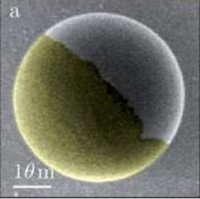 Dynamical collective behavior observed in, e.g., schools of fish and flocks of birds can often be described with simple models of so-called self-propelled particles. Even complex behavior can be reproduced by simple rules that are followed by all individuals (e.g., follow your neighbors but do not bump into them). On the microscale, both bacteria and colloidal particles have emerged as model systems to study a wealth of different phenomena such as swirling, swarming, and turbulence. Dynamical collective behavior observed in, e.g., schools of fish and flocks of birds can often be described with simple models of so-called self-propelled particles. Even complex behavior can be reproduced by simple rules that are followed by all individuals (e.g., follow your neighbors but do not bump into them). On the microscale, both bacteria and colloidal particles have emerged as model systems to study a wealth of different phenomena such as swirling, swarming, and turbulence.
We are especially interested in the novel collective properties of colloidal Janus particles that are propelled by diffusio-phoresis or similar means, which have been realized experimentally very recently. Depending on the interplay of volume exclusion, hydrodynamic alignment of orientations, and attractive forces, several phenomena like living crystals and phase separation are observed.
For more information, please contact Thomas Speck and Peter Virnau.
|